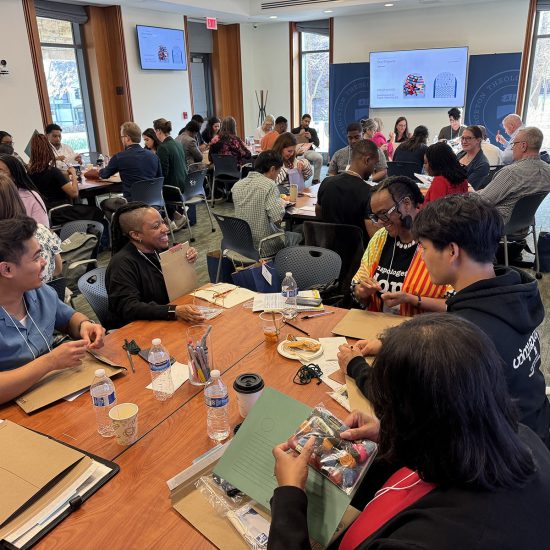
I have had multiple conversations with pastors and other church leaders in recent weeks revealing the final hurdle in our return from the limitations of the global pandemic might be the most challenging. During these conversations, my friends and colleagues share the difficulty they are having uniting congregations that have spent the past 15-months separated from one another by crisis.

Greg Mamula
No two challenges are the same. Some are having difficulty with congregants returning and staking claims to former analog ministry leadership roles that other members have been leading in online formats, creating tension between in person and online ministry approaches and church leadership dynamics. Some congregations have relied heavily on their pastor’s abilities to lead worship services, format, edit, and post digital content, engage in community connections, lead small groups, and a host of other ministry opportunities. Now as people are returning to more familiar formats of worship and ministry, they want their pastors to continue doing these things, while bringing back and leading all the usual ministry activities, pushing them beyond their skill levels and time availability.
Some pastors and congregations have been in hibernation for the past year. They are still alive, but weak and will require a season of waking up and once again practicing habits of discipleship before they are ready to engage more fully in mission and ministry. And still others will spend the next year mending fences and initiating reconciliation to repair all the rhetoric and accusations hurled at fellow church members on social media from the safety of their living rooms.
To help bring unity out of will require a new commitment to community life. We must be drawn away from the temptation to retreat further into our silos that deepen our anger, minimize our complicity, and intensify our anxieties, preventing the sacred work of reconciliation, restoration, healing, and hope from taking root.
We need sacred space to where enemies can become neighbors; neighbors can become friends; and friends can become family. A place where our stories and be shared and known with all of their rich complexities, until they weave together into a cohesive fellowship, that embodies the fullness of life and unity in Christ.
The only thing big enough to hold all of life in this way is the table. Every aspect of our life intersects at the table. The table is where we celebrate our greatest achievements and mourn our deepest tragedies. It holds our dreams and our tears. It is where we ponder deeply the realities of life and our place within it. But mostly the table is where we eat. Eating with others is holy work because meals are the gateway into the deeper mysteries of faith and life.

(Janko Ferlič/Unsplash)
There is no room for naivety in utilizing such a metaphor and it has always been fraught with crisis. For example, Paul calls on the Jesus followers in Galatia and Colossae to see beyond traditional gender, social, and ethnic divides and recognize they are all one in Christ by first referring to them as brothers and sisters (see Galatians 3 and Colossians 3). The hope filled example of everyone uniting to share everything in common over meals and the common story of the resurrection in Acts 2 is quickly tempered by their unwillingness to welcome Gentiles into that story. Paul’s letters to local churches are filled with examples of Jesus followers abusing their fellow disciples and causing harm to the community of faith. Were it not for their struggles, we would not have much of the New Testament.
Community is hard work. Uniting men and women from different cultures, ethnicities, geographies, sexualities, political perspectives, financial wellness, and personalities in mutual submission to Christ and love for one another requires lots of courage and intentional effort. If we follow the way of the early church, we will discover most of the work is done one meal at a time. Eating meals with others creates the holy space necessary for meaningful relationships to develop. Through the table we start to see the beauty of the God-breathed image bearer in each of us. This is cause for celebration and wonderment.
If we are honest, we will realize not all is well. Difficult conversations must also be had at the table. Interpersonal and corporate grievances must be addressed: whom have I lied to, whose trust have I broken, what commitments have I failed to uphold, whom do I need to extend mercy and forgiveness? A community unwilling to gather at the table together to listen to Christ and to one another is a community destined for fraction.
This how the table begins to move us away from crisis and into community. Challenging conversations are best held at the table, because Christ alone hosts and possesses the capability to take us as we are, blessing us as image bearers, breaking us of the rough spots that do not conform to his kingdom vision, and returning us to world changed into kingdom citizens.
Living a life shaped by the table will not immediately change all the division and chaos. But it is the way out of crisis. The table creates space for us to see the world through the lens of Christ’s active workings in our lives and communities. The table creates space for us to be seen and loved and valued. The table creates space to meditate on scripture in the context of community. The table is where everything touches: the church and the neighborhood, faith and life, confession and forgiveness, listening and storytelling, communion and community.
Rev. Dr. Greg Mamula is the Associate Executive Minister for the American Baptist Churches of Nebraska, and a contributing writer for Word&Way. He is author of Table Life: An Invitation to Everyday Discipleship, published by Judson Press in print and e-reader versions from online distributers including Amazon. To learn more information visit www.table-life.org.






